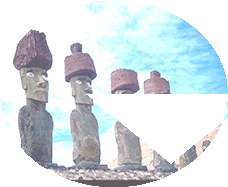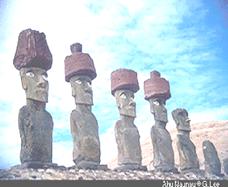网址:http://m.1010jiajiao.com/timu_id_797617[举报]

One of the greatest mysteries on Earth is the statues which stand on Easter Island. Easter Island, which was almost uninhabited when it was discovered on Easter Day in 1722 by a Dutch captain, is the most distant island in the world covered with hundreds of giant statues, each weighing several tons and some standing more than 30 feet tall.
Who built these statues and why and how did they get there? Nobody knows the answer for sure.
One theory suggests that Easter Island was first inhabited by Polynesians, who traveled thousands of miles in their canoes(独木舟)in 400 A.D. However, the ocean currents(洋流)which carried them there would not take them back, so that they could not leave.
The statues appear to have been made out of the top edge of the walls of a volcano on the island. Then, it may have been rolled or dragged down to the foot of the volcano(火山). Then, it was stood upright(直立)and ropes were tied around it, which was made to act as a pulley(滑轮). Over a period of months, a statue could be walked for miles down to the ocean. Finally, it was placed in line with other statues, all of them looking towards the center of the island.
This process was difficult. If a statue fell over, it was too heavy to be pulled upright again, so the islanders went back and carved another statue.
The population of Easter Island must have reached 11,000. Later, the resources of the island were used up and people began fighting and eating each other. Work on the statues stopped and the statues were knocked over. When the first Europeans finally arrived on the island, most of these people had died out.
【小题1】This passage is mainly about ________ .
| A.the discovery of Easter Island | B.the statues on Easter Island |
| C.the history of Easter Islanders | D.the earliest population on Easter Island |
a. It was stood upright and ropes were tied around it.
b. It was walked for miles down to the ocean.
c. It was placed in line with other statues.
d. It was moved to the foot of the volcano.
| A.c-d-a-b | B.d-b-a-c | C.a-c-b-d | D.d-a-b-c |
| A.Easter Island is the most distant island in the world |
| B.Easter is the name of a holiday |
| C.not all the statues were placed in a line |
| D.the island was once rich in natural resources |
| A.mysterious | B.lost |
| C.unknown to the world | D.with no people living there |

One of the greatest mysteries on Earth is the statues which stand on Easter Island. Easter Island, which was almost uninhabited when it was discovered on Easter Day in 1722 by a Dutch captain, is the most distant island in the world covered with hundreds of giant statues, each weighing several tons and some standing more than 30 feet tall.
Who built these statues and why and how did they get there? Nobody knows the answer for sure.
One theory suggests that Easter Island was first inhabited by Polynesians, who traveled thousands of miles in their canoes(独木舟)in 400 A.D. However, the ocean currents(洋流)which carried them there would not take them back, so that they could not leave.
The statues appear to have been made out of the top edge of the walls of a volcano on the island. Then, it may have been rolled or dragged down to the foot of the volcano(火山). Then, it was stood upright(直立)and ropes were tied around it, which was made to act as a pulley(滑轮). Over a period of months, a statue could be walked for miles down to the ocean. Finally, it was placed in line with other statues, all of them looking towards the center of the island.
This process was difficult. If a statue fell over, it was too heavy to be pulled upright again, so the islanders went back and carved another statue.
The population of Easter Island must have reached 11,000. Later, the resources of the island were used up and people began fighting and eating each other. Work on the statues stopped and the statues were knocked over. When the first Europeans finally arrived on the island, most of these people had died out.
【小题1】This passage is mainly about ________ .
| A.the discovery of Easter Island | B.the statues on Easter Island |
| C.the history of Easter Islanders | D.the earliest population on Easter Island |
a. It was stood upright and ropes were tied around it.
b. It was walked for miles down to the ocean.
c. It was placed in line with other statues.
d. It was moved to the foot of the volcano.
| A.c-d-a-b | B.d-b-a-c | C.a-c-b-d | D.d-a-b-c |
| A.Easter Island is the most distant island in the world |
| B.Easter is the name of a holiday |
| C.not all the statues were placed in a line |
| D.the island was once rich in natural resources |
| A.mysterious | B.lost |
| C.unknown to the world | D.with no people living there |
The Young Pioneers didn't know .
|
A.where will they go |
B.what they would do next |
|
C.when could they go |
D.how did they get there |
查看习题详情和答案>>
 One of the greatest mysteries on Earth is
the statues which stand on Easter Island. Easter Island, which was almost uninhabited
when it was discovered on Easter Day in 1722 by a Dutch captain, is the most
distant island in the world covered with hundreds of giant statues, each
weighing several tons and some standing more than 30 feet tall.
One of the greatest mysteries on Earth is
the statues which stand on Easter Island. Easter Island, which was almost uninhabited
when it was discovered on Easter Day in 1722 by a Dutch captain, is the most
distant island in the world covered with hundreds of giant statues, each
weighing several tons and some standing more than 30 feet tall.
Who built these statues and why and how did they get there? Nobody knows the answer for sure.
One theory suggests that Easter Island was first inhabited by Polynesians, who traveled thousands of miles in their canoes(独木舟)in 400 A.D. However, the ocean currents(洋流)which carried them there would not take them back, so that they could not leave.
The statues appear to have been made out of the top edge of the walls of a volcano on the island. Then, it may have been rolled or dragged down to the foot of the volcano(火山). Then, it was stood upright(直立)and ropes were tied around it, which was made to act as a pulley(滑轮). Over a period of months, a statue could be walked for miles down to the ocean. Finally, it was placed in line with other statues, all of them looking towards the center of the island.
This process was difficult. If a statue fell over, it was too heavy to be pulled upright again, so the islanders went back and carved another statue.
The population of Easter Island must have reached 11,000. Later, the resources of the island were used up and people began fighting and eating each other. Work on the statues stopped and the statues were knocked over. When the first Europeans finally arrived on the island, most of these people had died out.
1.This passage is mainly about ________ .
A. the discovery of Easter Island B. the statues on Easter Island
C. the history of Easter Islanders D. the earliest population on Easter Island
2. Which of the following correctly tells of the possible working process after a statue was made?
a. It was stood upright and ropes were tied around it.
b. It was walked for miles down to the ocean.
c. It was placed in line with other statues.
d. It was moved to the foot of the volcano.
A. c-d-a-b B. d-b-a-c C. a-c-b-d D. d-a-b-c
3. It’s not a fact that ________ .
A. Easter Island is the most distant island in the world
B. Easter is the name of a holiday
C. not all the statues were placed in a line
D. the island was once rich in natural resources
4.The underlined word uninhabited most probably means ________.
A. mysterious B. lost
C. unknown to the world D. with no people living there
查看习题详情和答案>>
 One of the greatest mysteries on Earth is
the statues which stand on Easter Island. Easter Island, which was almost uninhabited
when it was discovered on Easter Day in 1722 by a Dutch captain, is the most
distant island in the world covered with hundreds of giant statues, each
weighing several tons and some standing more than 30 feet tall.
One of the greatest mysteries on Earth is
the statues which stand on Easter Island. Easter Island, which was almost uninhabited
when it was discovered on Easter Day in 1722 by a Dutch captain, is the most
distant island in the world covered with hundreds of giant statues, each
weighing several tons and some standing more than 30 feet tall.
Who built these statues and why and how did they get there? Nobody knows the answer for sure.
One theory suggests that Easter Island was first inhabited by Polynesians, who traveled thousands of miles in their canoes(独木舟)in 400 A.D. However, the ocean currents(洋流)which carried them there would not take them back, so that they could not leave.
The statues appear to have been made out of the top edge of the walls of a volcano on the island. Then, it may have been rolled or dragged down to the foot of the volcano(火山). Then, it was stood upright(直立)and ropes were tied around it, which was made to act as a pulley(滑轮). Over a period of months, a statue could be walked for miles down to the ocean. Finally, it was placed in line with other statues, all of them looking towards the center of the island.
This process was difficult. If a statue fell over, it was too heavy to be pulled upright again, so the islanders went back and carved another statue.
The population of Easter Island must have reached 11,000. Later, the resources of the island were used up and people began fighting and eating each other. Work on the statues stopped and the statues were knocked over. When the first Europeans finally arrived on the island, most of these people had died out.
1.This passage is mainly about ________ .
A. the discovery of Easter Island B. the statues on Easter Island
C. the history of Easter Islanders D. the earliest population on Easter Island
2. Which of the following correctly tells of the possible working process after a statue was made?
a. It was stood upright and ropes were tied around it.
b. It was walked for miles down to the ocean.
c. It was placed in line with other statues.
d. It was moved to the foot of the volcano.
A. c-d-a-b B. d-b-a-c C. a-c-b-d D. d-a-b-c
3. It’s not a fact that ________ .
A. Easter Island is the most distant island in the world
B. Easter is the name of a holiday
C. not all the statues were placed in a line
D. the island was once rich in natural resources
4.The underlined word uninhabited most probably means ________.
A. mysterious B. lost
C. unknown to the world D. with no people living there
查看习题详情和答案>>